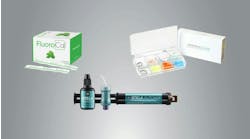By Leslie Icenogle
Do you spend more time discussing treatment with your patients than performing treatment? You can be more productive performing procedures by assigning an implant coordinator (IC); and use this person properly.
- Educate your patient. Allow your IC to meet with your patient prior to your diagnosing; ask questions, show visual aids, gather information about their decision-making process, discuss stages of implant treatment, and provide an "appointment sequencing form" that walks them through the process (eliminates fear of unknown). Educate patients about options and discuss treatment briefly so they may become familiar with the process before your clinical examination. Build a relationship.
- Introduce your patient. Your IC will summarize the patient's discussion with you in front of the patient. Confirm with the patient that it is correct by asking him or her a closed-end question; 20 seconds vs. the 20-minute description the patient gave. Now you can diagnose and cover the patient's concerns and motivating factors.
- Coordinate diagnostics. The IC will coordinate impressions, CT scans, Panorex, photos, complete lab scripts, etc. It is nice if this person is trained with some clinical skills. ICs often come from an administrative background due to their comfort with insurance, monies, and the treatment plan discussion.
- Discuss finances. At the beginning, your IC should inform the patient that financial questions will be addressed after the doctor determines if the patient is a candidate. This allows the patient to be focused on treatment when he or she meets you. After your clinical assessment and plan, your IC may now cover cost and provide financial options. Do not rush this process. Patients often need to be brought back to benefits at this point. Confirm finances and office expectations. By delegating finances to an IC, you will gain an enormous amount of time and remain in a positive light.
- Schedule next contact. Now your patient is naturally excited! Most patients will be ready to proceed with at least some of the treatment. However, not all patients will be completely ready to commit at this point. Have your IC offer a second, no-cost consultation; invite the spouse. Schedule a follow-up call. Offer to send some additional information and determine what the best time to call is and follow up. The IC will now bring up some of the patient's initial motivating factors, and then schedule the next contact and follow through (build trust).
- Coordinate preoperative needs. Meet with your IC weekly for 10 minutes or less. Discuss upcoming cases (this helps eliminate interruptions). The IC will coordinate supplies; implants, materials, healing abutment, etc. Confirm that lab work will be completed. Gather insurance precertification. Send the patient a follow-up letter to reduce "buyer's remorse." Have your IC be available for the implant patient.
- Meet with patient the day of the procedure. Your IC will greet the patient and provide reassurance, and relax the patient. Answer last-minute questions, obtain consent, collect monies, call in prescribed postop medications, and deliver the patient to the clinical team (handoff). Typically the coordinator will not assist in surgery mainly because this person needs to be available for other patients vs. being chairside. Consultations may be scheduled simultaneously to acquire future cases.
- Prepare for restoration. Your IC will confirm necessary impression materials and parts are on hand, insurance/account is paid prior to additional procedures. Build excitement for delivery date.
- Perform other IC duties. Build relationships with sale representatives to reduce cost and provide financial support for patient seminars; evaluate insurance plans and reimbursement; track nonscheduled cases; create standard operational procedures for their duties in case of absence; script answers for other team members; organize inventory; marketing; plan and run patient seminars; own 10 minutes of the monthly team meeting to educate and update team on goals.
Designating a team member as your implant coordinator will help increase case acceptance and make the implant process more systematic and productive. You will be doing more cases and spending only quality time with the patient. Implant consultations should take five to 10 minutes of doctor time. Let me challenge you to stop talking and start performing.
Increase your revenue and build a successful implant practice today by implementing an implant coordinator!
Leslie Icenogle is founder of Dental Implant Auxiliary Training providing lectures, coaching, manuals, and interactive webinars. Leslie has 30 years' experience as an implant coordinator and practice manager. Grow your implants and your profit; contact Leslie at [email protected] and visit www.teamimplants.com to register for webinars.
Past DE Issues





